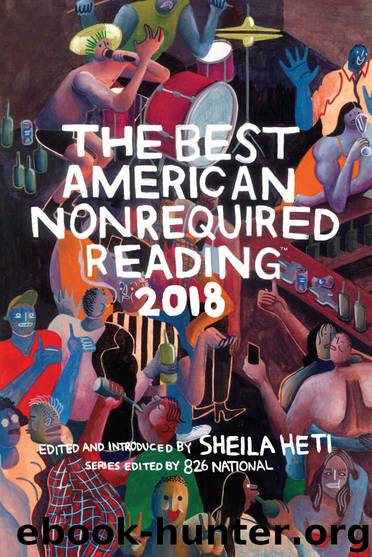The Best American Nonrequired Reading 2018 (The Best American Series ®) by Sheila Heti

Author:Sheila Heti [Heti, Sheila]
Language: eng
Format: azw3
Publisher: Houghton Mifflin Harcourt
Published: 2018-10-01T16:00:00+00:00
CSS: This is really provocative. Are you saying then—let’s just focus on the U.S.—that every African American, regardless of income or wealth or status, can and should be understood in the figure of the slave who is socially dead in relation to the master, who I presume is white?
FW: Well, the master is everyone else, whites and their junior partners, which in my book are colored immigrants. It’s just that colored immigrants exist in an intra-human status of degradation in relation to white people. They are degraded as humans, but they still exist par-adigmatically in that position of the human. So yes, I am saying that. Now part of the reason is that one of the things that we are not doing is talking about the different ways in which different Black people live their existence as slaves. I’m willing to do that, but what’s interesting to me is the kind of anxiety that this theory elicits from people other than yourself. I mean this is the calmest conversation that I’ve had on this subject [laughter]. You could say to someone that you are a professor at UC Berkeley and there is a person in a sweatshop on the other side of the Rio Grande. This person in the sweatshop is working sixteen hours a day, cannot go to the bathroom, dies on the job from lack of medical benefits . . . and you are a kind of labor aristocrat. And they could say, “Okay, well that’s interesting.” And you could say to that person, “But if you read the work of Antonio Negri, the Italian communist, you come to understand that even though you live your life as a proletarian differently than a sweatshop laborer, you both stand in relation to capital in this same way, at the level of structural, paradigmatic arrangement.” That person would say, “Oh yeah! I get that, I get that.” You say to someone that all Blacks are slaves and that we’re going to change the definition of slavery because the other things are not definitions, they are actually anecdotes, and your teacher in third grade told you that you don’t use an anecdote to define something. And that person says, “Oh wait a minute, I know a person who’s richer than me and also Black and they live in the Tenderloin . . .” and it just goes off to the races. It’s a symptomatic response primarily because they understand that what Black people suffer is real and comprehensive but there is actually no prescriptive, rhetorical gesture which could actually write a sentence about how to redress that. Most Americans, most people in the world, are not willing to engage in a paradigm of oppression that does not offer some type of way out. But that is what we live with as Black people every day.
Download
This site does not store any files on its server. We only index and link to content provided by other sites. Please contact the content providers to delete copyright contents if any and email us, we'll remove relevant links or contents immediately.
| African American | Asian American |
| Classics | Anthologies |
| Drama | Hispanic |
| Humor | Native American |
| Poetry | Southern |
Crazy Rich Asians by Kevin Kwan(9279)
How to Bang a Billionaire by Alexis Hall(8146)
Giovanni's Room by James Baldwin(7330)
Win Bigly by Scott Adams(7184)
Little Fires Everywhere by Celeste Ng(7184)
Pachinko by Min Jin Lee(5685)
Tease (Temptation Series Book 4) by Ella Frank(5628)
The Fire Next Time by James Baldwin(5431)
The Perks of Being a Wallflower by Stephen Chbosky(4639)
China Rich Girlfriend by Kwan Kevin(4558)
Bluets by Maggie Nelson(4548)
First Position by Melissa Brayden(4520)
The Sympathizer by Viet Thanh Nguyen(4385)
Rich People Problems by Kevin Kwan(4284)
A Little Life (2015) by Hanya Yanagihara(4278)
Right Here, Right Now by Georgia Beers(4198)
Walking by Henry David Thoreau(3953)
Catherine Anderson - Comanche 03 by Indigo Blue(3621)
The Death of the Heart by Elizabeth Bowen(3610)
